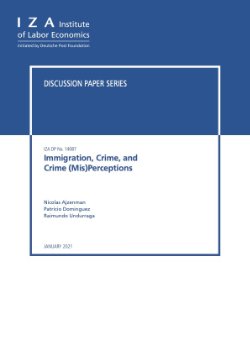Immigration, Crime, and Crime (Mis)Perceptions
By Nicolas Ajzenman, Patricio Dominguex, and Raimundo Undurrage
This paper studies the effects of immigration on crime and crime perceptions in Chile, where the foreign-born population more than doubled in the last decade. By using individual-level victimization data, we document null effects of immigration on crime but positive and significant effects on crime-related concerns, which in turn triggered preventive behavioral responses, such as investing in home-security. Our results are robust across a two-way fixed effects model and an IV strategy based on a shift-share instrument that exploits immigration inflows towards destination countries other than Chile. On mechanisms, we examine data on crime-related news on TV and in newspapers, and find a disproportionate coverage of immigrant-perpetrated homicides as well as a larger effect of immigration on crime perceptions in municipalities with a stronger media presence. These effects might explain the widening gap between actual crime trends and public perceptions of crime.
Bonn: IZA – Institute of Labor Economics, 2021. 57p.


